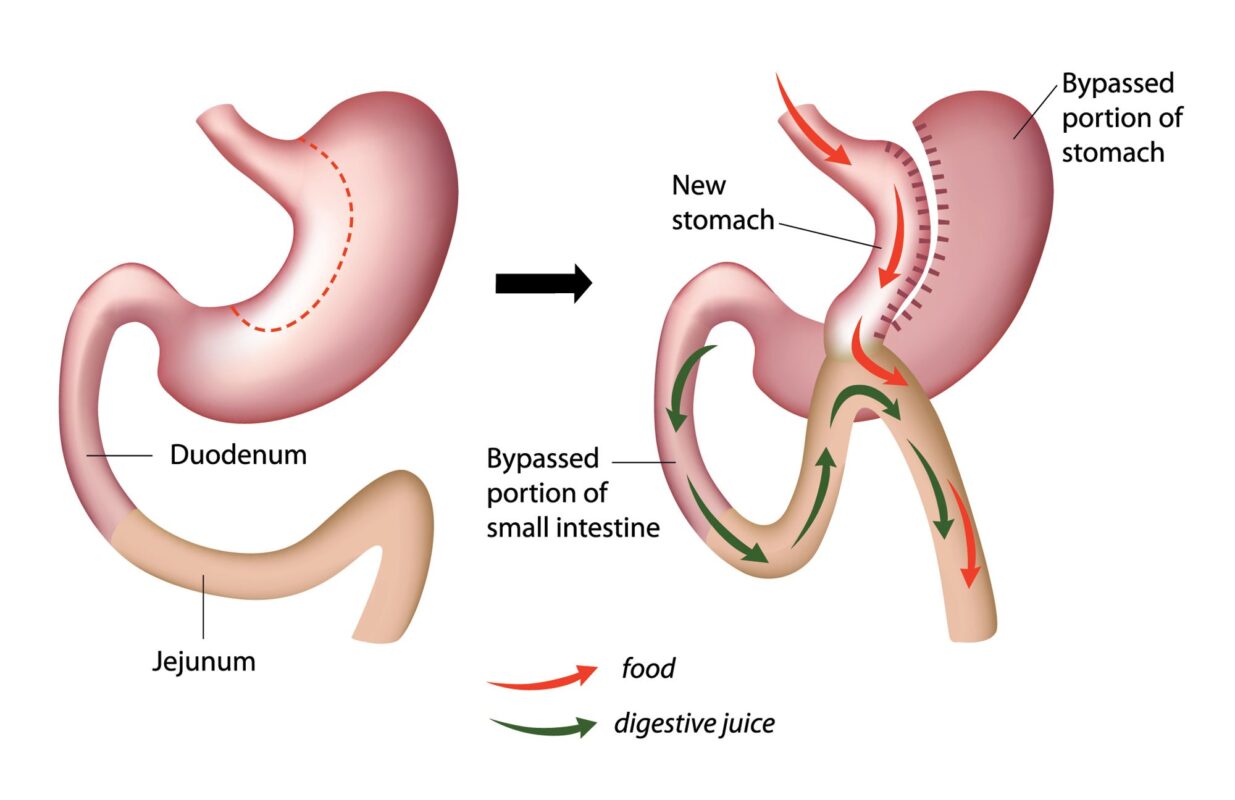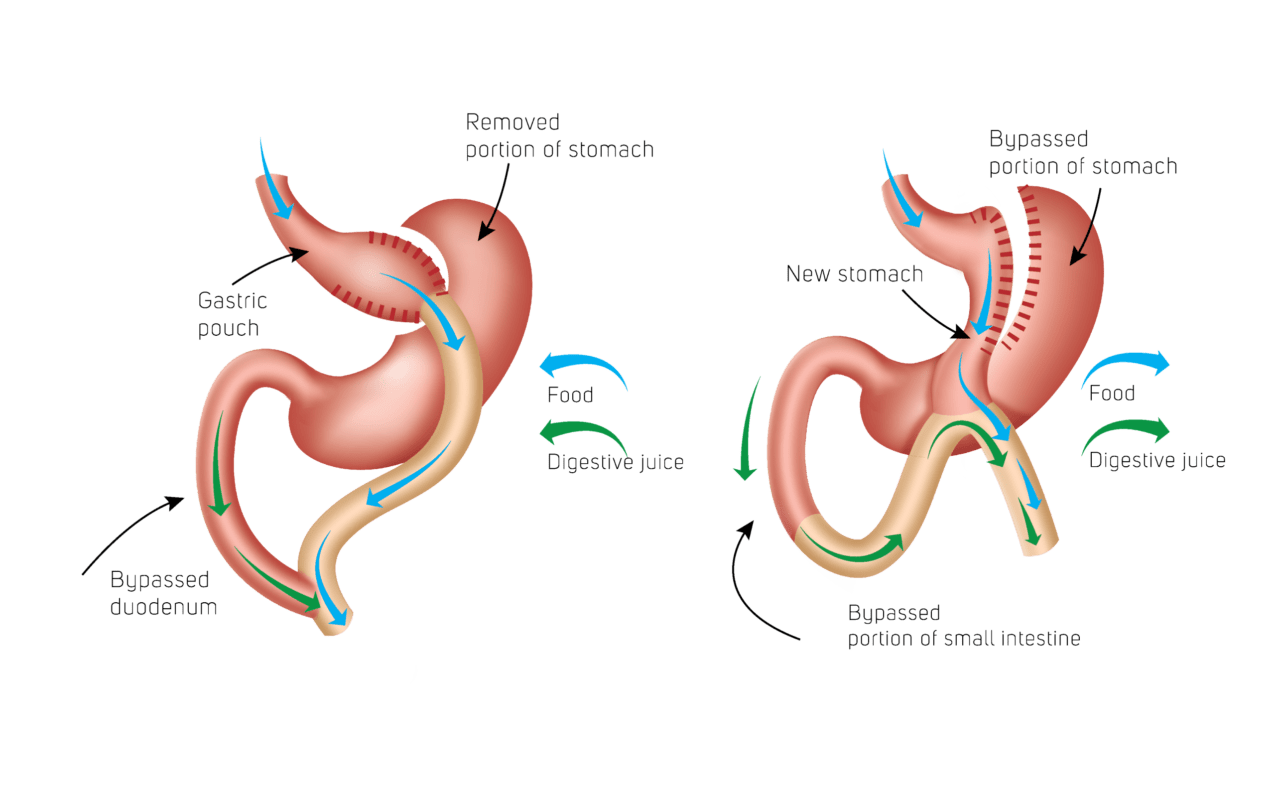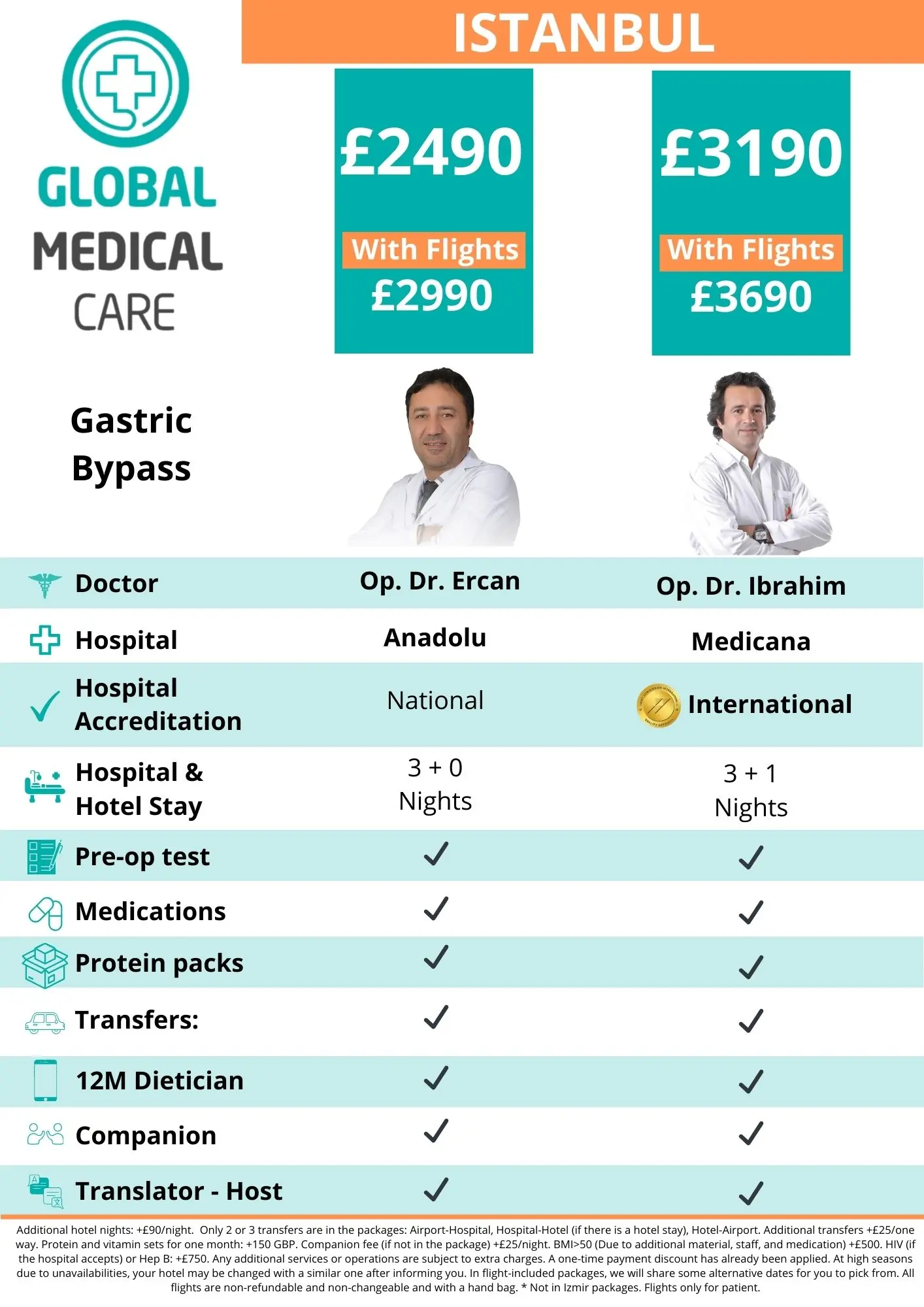Reclaim Your Health, Redefine Your Future
Gastric Bypass
Bariatric Surgery operations performed by selected surgeons with our Swiss Quality
![]()

Gastric bypass surgery is a medical procedure that can help individuals struggling with obesity achieve significant and long-lasting weight loss. It involves making changes to the digestive system to limit the amount of food that can be consumed and absorbed by the body. This surgery is considered a life-changing solution for weight loss because it can lead to not only physical transformation but also improvements in overall health and well-being.
During gastric bypass surgery, a small pouch is created at the top of the stomach, which serves as the new stomach. This pouch is then connected directly to the small intestine, bypassing a large portion of the stomach and the upper part of the small intestine. By doing so, the amount of food that can be eaten and absorbed by the body is significantly reduced, leading to weight loss.

The gastric bypass surgery process involves several key steps, starting with the administration of anesthesia to ensure the patient’s comfort during the procedure. The surgeon then makes small incisions in the abdomen to access the stomach. The procedure can be performed using traditional open surgery or minimally invasive laparoscopic techniques. Laparoscopic surgery involves the use of a small camera and specialized surgical instruments inserted through the incisions, allowing the surgeon to visualize and operate on the stomach.
Once the surgeon has access to the stomach, they create a small pouch at the top using staples or sutures. This pouch will serve as the new, smaller stomach. The surgeon then disconnects a portion of the small intestine and connects it directly to the newly created pouch. This bypasses a section of the stomach and the first part of the small intestine, altering the digestive process. The remaining stomach and bypassed section of the intestine are reconnected further down the digestive tract to ensure the flow of digestive juices.
After completing the necessary adjustments, the surgeon closes the incisions with sutures or surgical staples. The length of the surgery varies depending on the complexity of the case and the chosen surgical technique. Once the surgery is complete, the patient is moved to a recovery area for close monitoring. Most patients can expect to stay in the hospital for a few days after gastric bypass surgery to ensure proper healing and recovery.
Mini gastric bypass (MGB) is a type of gastric bypass procedure used in obesity surgery. In this procedure, the stomach is transformed into a smaller pouch (mini stomach), and a connection is created to the small intestine. This method serves as an option for the treatment of obesity and related conditions.
MGB is one of several variations of the gastric bypass procedure. In the traditional gastric bypass procedure, a portion of the stomach is cut to create a smaller pouch, which is then connected to the small intestine. Mini gastric bypass is a shortened version of this procedure, requiring less surgical intervention.
By reducing the volume of the stomach, mini gastric bypass helps individuals eat less and feel full more quickly. Additionally, the connection to the small intestine limits nutrient absorption, promoting weight loss. However, it’s important to discuss the risks and benefits of this procedure with a doctor, as the most suitable surgical approach may vary for each patient.

There are two primary types of gastric bypass procedures: the traditional gastric bypass and the mini gastric bypass. While both procedures aim to achieve weight loss through similar mechanisms, there are some differences in their approaches.
The traditional gastric bypass, also known as the Roux-en-Y gastric bypass, involves creating a small stomach pouch and bypassing a portion of the small intestine. This procedure reroutes the digestive tract, limiting the amount of food that can be eaten and reducing calorie absorption. The traditional gastric bypass has been widely performed for decades and has proven to be effective in helping individuals achieve significant weight loss.
On the other hand, the mini gastric bypass, also referred to as the single-anastomosis gastric bypass, is a simpler and less invasive procedure. It involves creating a longer and narrower stomach tube, which is then attached to the small intestine. While the mini gastric bypass is less commonly performed compared to the traditional gastric bypass, it has gained popularity due to its shorter operating time and potentially lower complication rates.
Gastric bypass surgery offers numerous benefits for individuals struggling with obesity. First and foremost, it can result in significant and sustained weight loss. Many patients experience a loss of up to 60-80% of their excess body weight within the first year after surgery. This weight loss can have a profound impact on overall health, reducing the risk of obesity-related conditions such as diabetes, high blood pressure, and heart disease.
In addition to weight loss, gastric bypass surgery can also improve or resolve other obesity-related health conditions. Many patients experience improvements in type 2 diabetes, sleep apnea, joint pain, and high cholesterol levels. The surgery can also lead to increased energy levels, improved mobility, and an enhanced quality of life.
The recovery process after gastric bypass surgery can vary from person to person but generally involves a few weeks of healing and adjustment. During the initial days after surgery, patients may experience some pain, swelling, and fatigue. It is important to take prescribed pain medications, rest, and gradually increase activity levels under the guidance of the medical team.
As the weeks go by, patients will start to notice changes in their appetite and weight loss. Regular follow-up appointments will be scheduled to monitor progress, address any concerns, and provide ongoing support. Patients must adhere to the recommended dietary and lifestyle modifications to ensure optimal recovery and weight loss success.
![]() Operations Performed Using Newest Proven Methods
Operations Performed Using Newest Proven Methods
![]() Multiple Choice Of Expert Doctors That Will Suit Your Needs
Multiple Choice Of Expert Doctors That Will Suit Your Needs
![]() Best Price Guarantee
Best Price Guarantee
![]() 12 Months Support - Proactive Online Support
12 Months Support - Proactive Online Support
![]() Best Price Guarantee
Best Price Guarantee
![]() Payment in your Country
Payment in your Country
![]() European Contract
European Contract
Expert doctors define the best technique for your desired end result by combining the newest methodologies.
Then, your operation is performed using these methods based on your needs for your best results.
For our clients, handpicked hospitals follow strict high international standards. So with us, you know that your operation will be done with high quality.

Swiss Company
Swiss Quality Commitment
At Global Medical Care, we specialize in offering exceptional gastric bypass Istanbul. Our unwavering dedication to healthcare excellence is evident in our meticulously crafted patient experience, blending top-tier medical care with personalized attention to detail.
Renowned in the realm of medical tourism, Global Medical Care boasts an extensive network of premier hospitals and highly skilled bariatric surgeons throughout Turkey. Our partner hospitals hold global accreditations and are equipped with state-of-the-art technology and infrastructure to ensure the utmost standard of patient care
Gastric bypass surgery is just one of several weight loss surgeries available today. Each procedure has its own set of benefits, risks, and considerations. It is essential to consult with a qualified healthcare professional to determine which procedure is most suitable for your individual needs and goals. Here is a brief comparison of gastric bypass surgery with other common weight loss surgeries
The gastric sleeve procedure involves removing a portion of the stomach, creating a smaller stomach pouch. Unlike gastric bypass surgery, the gastric sleeve does not involve rerouting the small intestine. The gastric sleeve is less complex and generally has a shorter operating time compared to gastric bypass surgery. Both procedures can result in significant weight loss, but the choice depends on individual factors and preferences.
Gastric band turkey, also known as adjustable gastric banding, involves placing a silicone band around the upper part of the stomach to create a small pouch. Unlike gastric bypass surgery, gastric banding does not involve stomach stapling or intestinal rerouting. Gastric banding is reversible and adjustable, but it may result in slower weight loss compared to gastric bypass surgery.
The duodenal switch procedure combines aspects of both gastric bypass surgery and gastric sleeve surgery. It involves removing a portion of the stomach and rerouting the small intestine, similar to gastric bypass surgery. However, the duodenal switch procedure is more complex and typically reserved for individuals with severe obesity or specific metabolic conditions.
Ultimately, the choice of weight loss surgery depends on various factors, including your medical history, body mass index, lifestyle, and personal preferences. A thorough evaluation by a qualified healthcare professional will help determine the most suitable procedure for you.
The gastric sleeve procedure, a type of bariatric surgery designed to assist with weight loss, is generally considered safe and effective. However, like any surgical intervention, it does carry potential side effects. Common side effects may include nausea, vomiting, and temporary difficulty in swallowing. In some cases, patients may experience more severe complications such as infection, bleeding, or leaks at the surgical site. Additionally, there is a possibility of long-term side effects, such as nutritional deficiencies or gastroesophageal reflux disease (GERD).
Gastric bypass surgery significantly reduces the amount of food you can eat, and you will need to make permanent changes to your eating habits. While you will be able to eat a variety of foods, portion sizes will be much smaller, and certain foods may need to be avoided or limited to prevent discomfort or complications.
The amount of weight loss varies from person to person, but on average, individuals can expect to lose 60-80% of their excess body weight within the first year after surgery. It is important to remember that weight loss is gradual and may plateau after some time. The success of the surgery also depends on adherence to dietary and lifestyle recommendations.
Recovering from gastric bypass surgery is crucial for success. Here are key tips:
Follow Medical Advice: Stick to post-op instructions for diet, activity, and medication.
Gradual Activity: Ease back into exercise under medical guidance.
Nutrition and Hydration: Adhere to prescribed diets and stay hydrated.
Watch for Complications: Monitor for signs of infection or other issues.
Emotional Support: Seek help for emotional adjustments post-surgery.
Regular Check-ups: Attend follow-up appointments for monitoring.
Be Patient: Results take time; stay committed to your health goals.
Although Gastric Bypass is generally regarded as a safe and effective weight loss procedure, it’s essential to grasp the potential risks and considerations involved. Similar to any surgical intervention, inherent risks exist, underscoring the importance of selecting a qualified and experienced healthcare provider to minimize these risks.
Potential risks associated with Gastric Bypass include infection, bleeding, leakage, nutritional deficiencies, and complications related to anesthesia. Your healthcare provider will discuss these risks with you during the consultation phase, providing detailed information on how they will be managed to ensure the best possible outcome.
Maintaining realistic expectations regarding the outcomes of Gastric Bypass surgery is crucial. While it can lead to significant weight loss and improvements in overall health, individual results may vary based on factors such as adherence to dietary and lifestyle changes. Your healthcare provider will assess your unique circumstances and discuss achievable outcomes during the consultation, enabling you to make informed decisions about the procedure.
Gastric bypass surgery carries risks such as nausea, dumping syndrome, and nutritional deficiencies. Complications like infection, blood clots, or bowel obstruction may occur. Close follow-up with healthcare providers and adherence to dietary guidelines are essential for minimizing these risks and achieving successful weight loss results.
Bariatric surgery is usually advised for individuals with a BMI of 30 or higher with or without obesity-related health conditions. However, a thorough evaluation by a healthcare professional is essential to determine suitability. Candidates must commit to long-term lifestyle changes, including a healthy diet and regular physical activity, and have a clear understanding of the associated risks and benefits. It’s important to note that each patient’s situation is unique, and, therefore, the most accurate decision is made by expert surgeons.

For more information about Gastric Bypass
Gastric Bypass costs UK range from £8,000 to £15,000. Opt for GM Care in Turkey for competitive pricing and quality service, making gastric surgery costs financially feasible.

Obesity Surgery In Turkey
Flight, transfers, operation, hotel, and medication included

BOOK YOUR COMPLIMENTARY CONSULTATION NOW!
Gastric bypass surgery is a lifelong alteration. The segment of the stomach bypassed during the operation does not regenerate. However, preserving the benefits of weight loss demands a long-term dedication to healthy lifestyle modifications, such as dietary habits and regular physical activity.
Compared to numerous Western nations, the cost of gastric bypass surgery in Turkey is significantly lower, typically varying from $3,500 to $6,500. This all-encompassing expense includes the surgical procedure, hospital accommodation, pre and post-operative care, and in many cases, travel arrangements.
Patients are generally advised to stay in Turkey for approximately 7-10 days following gastric bypass surgery. This timeframe allows for a couple of days in the hospital post-surgery, followed by routine check-ups and a recovery period before returning home.
Post gastric bypass surgery, patients will need to adjust to a new eating regimen. Initially, the diet comprises liquids, gradually transitioning to pureed, soft, and then solid foods. Over time, patients can consume a variety of foods, albeit in considerably smaller portions than before the surgery.
Three months after gastric bypass surgery, patients can generally include most liquids in their diet, including non-carbonated, non-alcoholic beverages. However, it’s always crucial to adhere to your surgeon’s or dietitian’s guidelines.
Yes, undergoing a gastric bypass surgery in Turkey is safe. Turkey is recognized for its superior medical facilities, proficient surgeons, and rigorous healthcare standards. Global Medical Care ensures that all procedures are conducted at hospitals accredited internationally.
Numerous hospitals in Turkey are well-known for bariatric procedures like gastric bypass surgery. Global Medical Care partners with the best among them, ensuring the highest level of patient care and safety.
The timeline for arranging gastric bypass surgery in Turkey mainly depends on the individual’s health evaluation and necessary preparation for the surgery. Generally, it can be scheduled within a few weeks following the preliminary consultation.
Certainly. Turkish healthcare is renowned for its quality and advancements. The country is home to many JCI-accredited hospitals, experienced surgeons, and successful patient outcomes, making it a reliable destination for a range of surgical procedures.
Yes, Turkey is a secure destination for weight loss surgery, providing top-notch healthcare services at economical rates. Global Medical Care guarantees patient safety and satisfaction by partnering with the leading hospitals and surgeons in Turkey.
Although every surgical procedure carries certain risks, duodenal switch surgery is often viewed as one of the more complex and riskier weight loss surgeries. However, it also yields significant weight loss. The choice of surgery should be based on an individual’s health profile and the doctor’s advice.
Turkey’s lower cost of living and efficient healthcare system allow it to offer medical procedures at lower prices. However, this does not compromise the standard of care. Turkey offers world-class medical services at affordable rates.
Weight loss surgery is more affordable in Turkey mainly due to the lower cost of living and healthcare services compared to many Western countries. Despite the lower prices, patients can still anticipate high-quality medical care, state-of-the-art healthcare facilities, and skilled surgeons.
The gastric band procedure is generally considered to be the least painful weight loss surgery as it is less invasive than other surgeries. However, the perception of pain varies among individuals and depends on several factors, including the surgical technique and post-operative care.
Every surgical procedure carries certain risks. Gastric surgeries may provide minor or severe medical complications. Before the surgery, you need to review these with your doctor specific to your case and take these into account before you decide on your surgery.
Gastric Bypass may be suitable for people who are looking for a weight loss method to manage obesity and have failed with other methods.
Side effects of Gastric Bypass surgery may include nausea, vomiting, gas, and changes in stool control.
Gastric Bypass surgery usually takes a few months to a year to be effective. Each patient is different.
The nutrition plan after Gastric Bypass surgery should include a balanced diet, frequent small portions, and vitamin supplements.
The follow-up process after Gastric Bypass surgery includes regular follow-up checks with your surgical team. These checks are important to monitor your health status and ensure early detection of any problems.
Activities such as low-impact exercises, walking, swimming, and cycling are recommended after Gastric Bypass surgery. However, you should create a suitable exercise program by talking to your doctor.
After Gastric Bypass surgery, you should be checked more frequently at the beginning. Afterward, regular check-ups should continue, depending on your doctor’s recommendations.